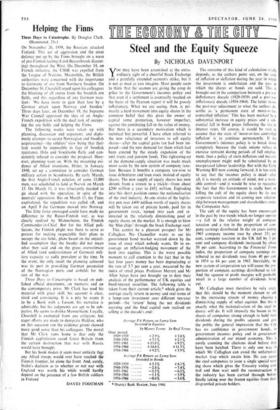Helping the Finns
Three Days to Catastrophe. By Douglas Clark. (Hammond, 25s.) ON November 26, 1939, the Russians attacked Finland. This act of aggression and the stout defence put up by the Finns brought on a wave of pro-Finnish feeling (Lord Beaverbrook dissent- ing) throughout the West. On December 14, on French initiative, the USSR was expelled from the League of Nations. Meanwhile, the British authorities were concerned with the importance to Germany of ore from Northern Sweden. On December 16, Churchill urged upon his colleagues the blocking of all routes from the Swedish ore fields, and this regardless of any German reac- tion: 'We have more to gain than lose by a German attack upon Norway and Sweden.' Three days later, on December 19, the Supreme War Council approved the idea of an Anglo- French expedition with the dual task of occupy- ing the ore fields and helping the Finns.
The following weeks were taken up with planning, discussion and argument; and diplo- matic attempts to secure Norwegian and Swedish acquiescence—the soldiers' view being that their task would be impossible in face of Swedish resistance. Oslo and Stockholm flatly and con- sistently refused to consider the proposal. How- ever, planning went on. With the mounting evi- dence of Allied intentions, Hitler, in January 1940, set up a committee to consider German military action in Scandinavia. By early March, the first Anglo-French echelon, of some 15,000 men, was scheduled to land at Narvik on March 15. On March II, it was reluctantly decided to go ahead with the operation, in spite of the neutrals' opposition. But on March 13, the Finns capitulated, the expedition was called off, and on April 9 the Germans moved into Norway.
The little force envisaged could have made no difference to the Russo-Finnish war, as was clearly realised by Mannerheim, the Finnish Commander-in-Chief. But for the Allied poli- ticians, the Finnish plight was there to serve as pretext for making respectable their plans to occupy the ore fields, plans based on the unjusti- fied assumption that the Swedes did not mean what they said and on the gross overestimate of Allied (and underestimate of German) mili- tary capacity so sadly prevalent at the time. In the event, the only result the planning achieved was its part in provoking German possession of the Norwegian ports and airfields for the rest of the war.
Three Days to Catastrophe is based on pub- lished official documents, on memoirs and on the contemporary press. Mr Clark has used his Material with great skill; his account is clear, vivid and convincing. It is a pity he wants it to be a Book with a Lesson; his narrative is admirable, but his judgments are apt to be sub- jective. He seems to dislike Mannerheim. Loyally, Churchill is exempted from any criticism; but eager efforts are made to denigrate Halifax, who on this occasion (on the evidence given) showed snore good sense than his colleagues. The moral that Mr Clark rams home is that only the Finnish capitulation saved Great Britain from the certain destruction that war with Russia would have brought.
But his book makes it seem most unlikely that any Allied troops would ever have reached tel Finnish frontier, let alone the front. And, surely, Stalin's decision as to whether or not war with England was worth his while would hardly depend on the presence of a few British soldiers in Finland.
DAVID FOOTMAN














































 Previous page
Previous page